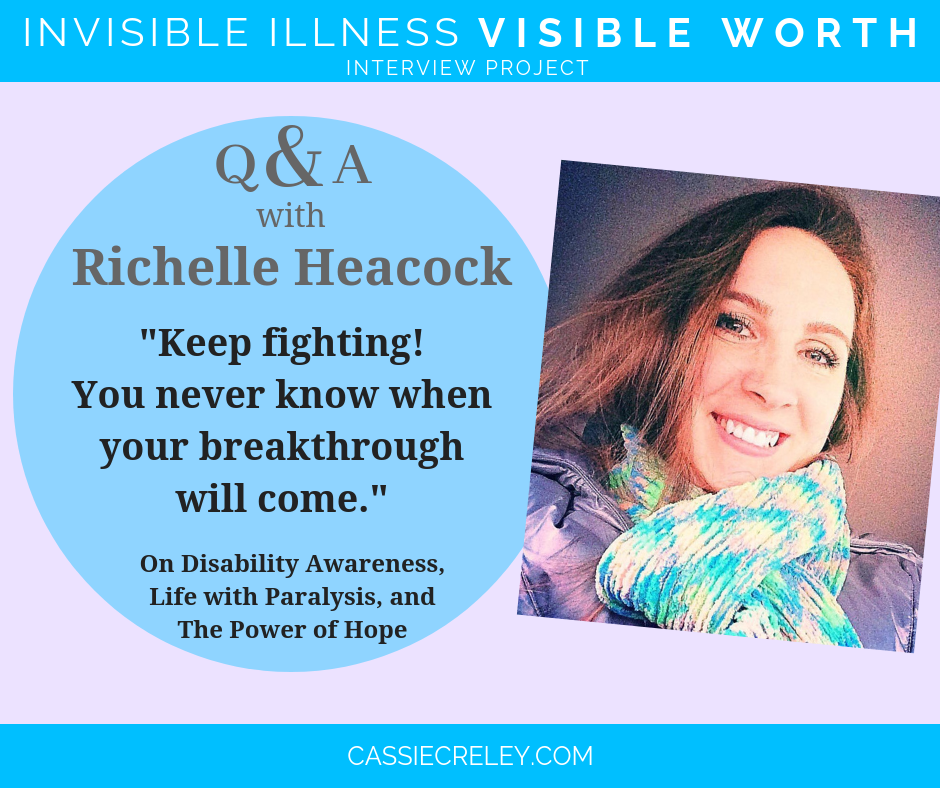
Q&A with Richelle Heacock: “Keep fighting! You never know when your breakthrough will come.”
Richelle Heacock runs a YouTube channel focused on awareness of disabilities, with an emphasis on spreading hope and love. Her video discussing viewer questions about how to interact with someone with a disability or someone who uses a wheelchair is very informative and insightful.
A car accident in 2010 left Richelle paralyzed, impacting her life and her identity as an athlete. Richelle worked as a volleyball coach for the first seven years following her accident, and is now focusing on her health and sharing her experiences and wisdom on YouTube.
I hope you’re encouraged by this conversation with Richelle on chronic illness, faith, and perseverance.
This post contains affiliate links.
Interview with Richelle Heacock from Washington, age 29
On Disability Awareness, Life with Paralysis, and The Power of Hope
Cassie: What is something you love or something God has given you a passion for?
Richelle: Before my accident and even after, I’ve been passionate about sports, volleyball in particular. I played in college and coached since I was in high school, through college and after my injury as well. I loved coaching and the challenge of teaching others how to do something without physically using my body like I did before.
Recently I have taken a break to focus on my health and have put my creative energy into a new YouTube channel. Since being disabled, I have seen so many injustices, misunderstandings, and the isolation that can be associated with a disability. I never thought twice about the person in a wheelchair on the sidelines while I played my volleyball match. I want to change that for others so we can create a more inclusive world.
Cassie: Please briefly share the names of your chronic illnesses along with a brief description.
Richelle: In 2010, I sustained a C5 level spinal cord injury that paralyzed me from the chest down. I’ve also developed PTSD and anxiety from that and subsequence other stresses I’ve endured since.
Cassie: What is one of the most difficult challenges you’ve experienced due to your illnesses? How has that challenge shaped you?
Richelle: I think one of the biggest challenges, and I think it’s universal with illness or injury or whatever, but your identity takes a huge blow when your life is impacted. I’ve always identified myself as an athlete: very strong, independent… Instantly, my world changed. I still saw myself as the athlete. But when I looked in the mirror or others saw me, that is not what people visually attributed to be me. People who knew me before, for the most part, still saw me the same. But there were many others who did not, and now just saw me as “the girl in the wheelchair.” This is something that I personally would struggle with. I did not even want to go out of my hospital room and allow others to see me in a wheelchair. It is hard to say how much of this identity crisis is self-imposed and how much is society driven. But I think they’re very intertwined and a constant struggle to fight back against.
Cassie: What is something you would like people to better understand about your illnesses?
Richelle: I really wish people understood the complexity of spinal cord injuries in particular. Each injury is different. It affects so much more than “not being able to walk”. . . temperature regulation, energy level, digestion, always having to be aware of skin issues, bladder issues, and many times PTSD that arises from the injury itself, as well as the constant anxiety to stay on top of every little thing post-injury to keep yourself out of the hospital.
It can be not only irritating, but also isolating for people who do not know your situation (or think they understand) to not only give unsolicited input—and sometimes downright judgments— on what you should and should not do. I think so many times others feel the need to give you their input, and it’s just their attempt at trying to fix or remedy your situation. They just want everything better for you. But so often people don’t realize that that adds anxiety, and there are probably about 100 other people telling you 100 other different things they see you should be doing too. I know I am guilty of this too. When I see my friends are hurting, I want to give them every tool I know of that might help. But I’ve found it is so freeing and peaceful to find people that say “Hey, I know I don’t get it all. But I know what you’re going through is really difficult. And I am here for you.”
Cassie: Tell me about a time when someone came through for you when you were going through your health struggles.
Richelle: I coached volleyball as a head coach for three years. During that time, I went through many different health issues. I have very low blood pressure, so sometimes I would feel like I was going to pass out or couldn’t talk anymore. Sometimes I felt like I was going to vomit and had to make a quick exit. My two assistant coaches, and two of my best friends, really helped me through this. They would pick up the slack if I had to rush out. Many times they held the garbage can for me as I threw up. And seamlessly took over talking when I was too lightheaded to do so. When I was exhausted, they encouraged me to take a break. To be successful in anything, it takes teamwork. But when your health issues are at the forefront, this makes it so much more evident and tangible. I could not do this life without my amazing family and friends!
Cassie: What advice or encouragement would you offer to someone going through chronic illnesses?
Richelle: Keep fighting! You never know when your breakthrough will come, or a huge step ahead is coming. This 24 hours could be completely different than the next. Especially when you deal with anxiety or panic attacks, it’s easy in that moment to feel like it’s always going to be that way, that it will never get better. But it will! Don’t be afraid to look outside the box. Do whatever you have to to keep yourself sane and explore any avenue available to you. I’ve found so much help in alternative medicine for myself. I don’t say it’s right for all, but it has helped me so much to be open to different possibilities.
Cassie: What is something God is teaching you recently?
Richelle: It is OK to cry and express your feelings! This sounds so basic. But I think especially when you’ve had an injury, live with a disability or illness, we have so much going on in life, we learn to push it down and just keep fighting. But I have found—I want to say in the last year or so, but honestly I’m learning every day—to cry out my feelings, to be honest. God can handle it and we can’t. He’s not afraid of our ugly feelings, our raw emotions. Whether it’s with God or people in our life, the more open and honest conversations we can have, the closer the relationship.
Cassie: What is something you are most thankful for right now?
Richelle: I don’t think this answer will ever change. I am beyond grateful for my family and friends! They are the best medicine, and I am convinced I have the best people in the world surrounding me!
Cassie: Are there any resources you can recommend that encourage you through your chronic illnesses?
Richelle: I never really joined a support group after my accident. I just had a great group of loyal friends and family that got me through. But more recently, I have found Claire Wineland’s YouTube Channel very helpful. Music is a big therapy for me: anything by Lauren Daigle; “Head Above Water” by Avril Lavigne is one song I play over and over and really speaks to me! She has Lyme disease and also founded an organization to help people living with chronic illness and disabilities: The Avril Lavigne Foundation. I know the Christopher & Dana Reeve Foundation is a huge resource for people with spinal cord injuries.
Cassie: I’m a bookworm and I have to ask: Read any good books lately?
Richelle: I am currently reading “Into the Magic Shop: A Neurosurgeon’s Quest to Discover the Mysteries of the Brain and the Secrets of the Heart.” It is SO good!
Cassie: What is something else you would like people to know about you?
Richelle: My extensive training as an elite athlete really prepared me for my journey through recovery. As an athlete you know results are never instantaneous; life isn’t fair; and to have a possibility of attaining your goals, you have to work incredibly hard for it, and sometimes make sacrifices to make it happen. Nothing is guaranteed in the sports world. And nothing is in the real world. But to optimize any chance of attaining your goals, hard work is a must!
Thank you Richelle!
Let us know what you enjoyed about this interview and what you learned in the comments!
Read more Invisible Illness, Visible Worth interviews here.
Interested in being interviewed? I’d love to help share your story! Find the details here.
Opinions and views are those of the interviewee. This blog post is meant for informational purposes only and is not intended as medical advice.
Pin it:
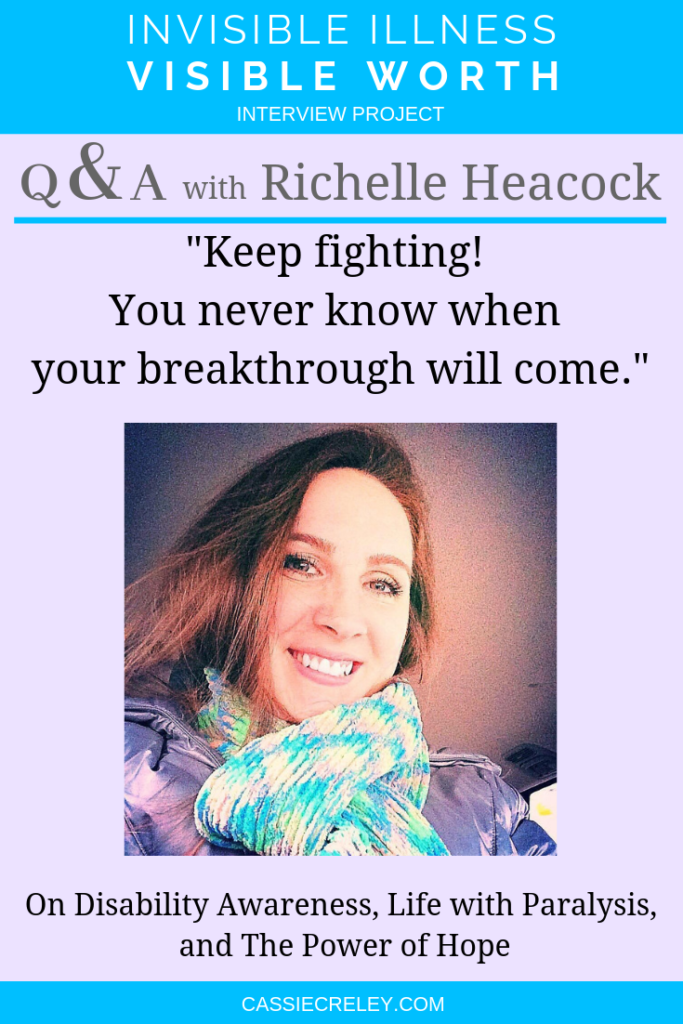


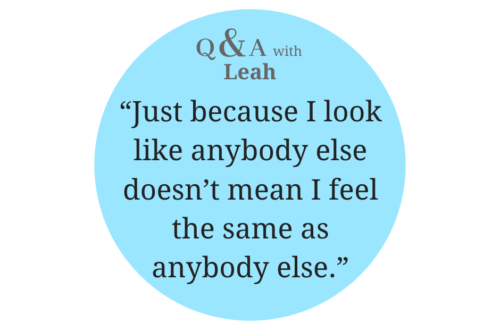
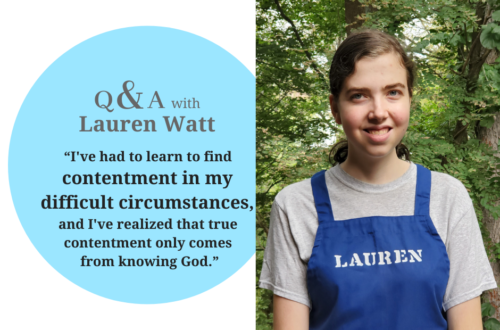
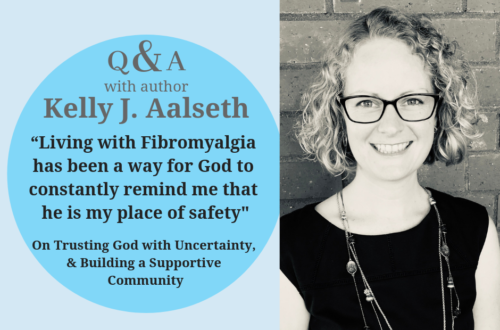
2 Comments
Gretchen
What an awesome interview! Thanks to Richelle for sharing and to Cassie for taking time to highlight her experience!
Cassie Creley
Thank you for being the one to connect us, Gretchen!